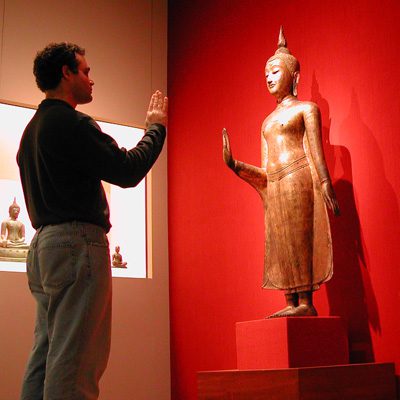 Around this time and around the world, the Buddha’s birthday is celebrated. I’ll take this occasion to reflect on the Buddha and what he means to me.
Around this time and around the world, the Buddha’s birthday is celebrated. I’ll take this occasion to reflect on the Buddha and what he means to me.
Archeological evidence suggests he was an actual person. The year’s of his existence are approximately 2500 years ago. The traditional time frame was adjusted forward 8o-some years after Professor Richard Gombrich discovered an error in the historical record. Regardless, it was a long time ago. Little is known about the actual life of the Buddha. Most of the information comes from self-references made during his discourses, and these were few and far between.
The legend of the Buddha appears to be more myth rather than actual. It astounds me that many Buddhist writers take the story literarily rather than as a parable. It is preposterous to assume that he had somehow been shielded from sickness, old age, and death until he was twenty-nine years old. Yet, this is the linch-pin of the story–when he first encountered these sufferings, he was motivated to find a path to end suffering. I rarely see this assumption questioned. It’s fatuous at best. He had relatives and servants who no doubt aged, got sick, and died. Gautama likely lived in the world and probably went away to college in Taxila along with other members of the ruling class.
Another feature of the myth was his princely status. Apparently, his father was more of a magistrate than a king. Still, Siddhartha did hang out with royalty like Prince and later King Pasenadi. He did refer to multiples palaces in the discourses and this is where his royal heritage is linked. I think it’s safe to assume that he lived a life of privilege.
As a parable, his life is instructive–he found a path between the extremes of indulgence and denial. After leaving the palace, he become a forest ascetic for a period of years. Nearly starving himself to death with severe practices, he abandoned that path to practice mindfulness under a pipal tree (now known as the Bodhi tree).
When we strip away the prophecy, embellishments, and preposterisms, the Buddha’s story is a story of renunciation and redemption. The Buddha was an exceptional man who showed us our potential as human beings. He was an exceptional, yet natural human. He was not superhuman. At least this is the image represented in the sutras. Centuries later he was portrayed as supernatural and worshipped as a god-like figure.
I find the Buddha’s secularity, the most appealing. I can investigate my buddhanature without beliefs, without doctrine, and without elevating the Buddha to a god. Buddhanature is psychological and empirical–testable in your own experience.
The image of the Buddha is a reminder of our potential to be in the world as happy human beings free from suffering, anguish, and pervasive dissatisfaction. I find that the methods that he taught–conscious living and meditation–work. If you try them, you just mind find that they work too.

